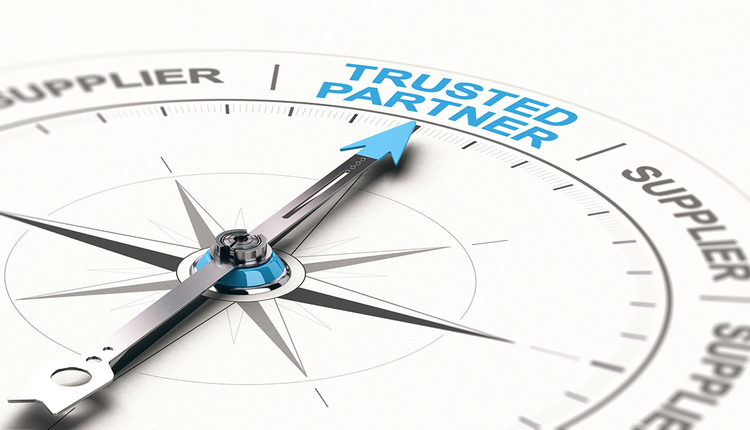part•ner•ship (noun)
a relationship resembling a legal partnership and usually involving close cooperation between parties having specified and joint rights and responsibilities
Merriam-Webster says a partnership can’t exist without cooperation. I couldn’t agree more — without a partnership, carriers and shippers are unlikely to achieve their desired results.
In the business world, partnerships are golden. On sound alone, they’re much warmer than “contractual agreement.”
The key to establishing and maintaining a long-term partnership is holding quarterly business reviews (QBR) with your top carriers. The growing complexity of data in the parcel industry and the need to share and analyze this information make a QBR a necessity.
Effective QBRs should address seven areas:
• Service performance. Use quarterly metrics to assess the overall performance (service type level, trends and origin level). Compare this to the carrier contract metrics. I recommend measuring the metric against “raw” data (actual performance without exceptions).
• Cost metrics. The devil’s in the details, so it’s important to review your costs from several angles. Remember the impact that the upward and downward movement of fuel prices had on your costs? Well, it also blocked some opportunities. Therefore, you need to look at metrics such as cost per shipment (at service type level), cost per pound, average weight per shipment, and outliers (e.g., Zone 2 air shipments, heavy air shipments).
• Contract compliance. An argument could be made that there’s nothing more difficult than ironing out a small-parcel contract. With the level of complexity, it’s no wonder that these contracts are filed until renewal time. However, the QBR is a great time to revisit the contract and remind all parties of the terms of the agreement. In fact, many mutually beneficial amendments come from QBR discussions. Remember, if both parties agree to them, changes can be made to contracts.
• Continuous improvement. The initial boost the agreement provides a business partnership lasts only so long. The key is in the ongoing value. Ask your carriers, “You had a great quarter, but what can we expect next quarter?” You’ll be pleasantly surprised by their answers. Most carriers have intelligent, creative representatives who can suggest value-added ideas that they’ve learned from other clients.
• New services. Carriers are always looking for new services to offer that will generate additional revenue and profit. These are typically driven by customer demands but could be a service that differentiates your organization from your competitors. Adding this to the agenda for your next QBR keeps it at the forefront of your discussions.
• Shipper improvements. Win-win relationships are just that — everyone benefits. As such, it’s important to offer up how you can help the carrier. This can create some very powerful opportunities. Carriers might be reluctant to ask for changes that they believe could jeopardize the relationship. However, by creating an open forum, you might learn that your willingness to change a costly process or procedure can create an opportunity — a win — for both of you.
• Next steps. Baseball managers always think two or three batters ahead. While fans worry about who’s at bat now, the manager is trying to figure out whether to send up a left-handed batter against a right-hander the other manager might put in the game in the next inning. Time will tell whether it’s the right or wrong move, but at least they have a plan.
In a similar vein, you need to have this mind-set for your QBR. You need to leave the QBR with an action plan for the future, driving both parties toward mutually beneficial goals and eliminating surprises. To execute the action plan and maintain the relationship, both the shipper and carrier need to designate a point person.
Although integral to developing and maintaining long-term partnerships, QBRs aren’t the only mechanism through which to interact with carriers. To stay updated on your carrier’s business, invest time in plant tours, executive meetings, and social gatherings (dinners/lunches/conferences).
Remember, a partnership is built on developing a mutually beneficial relationship with your carrier. Participating in QBRs and gaining important knowledge about your carrier’s business will pay off in the long run. And isn’t that what partnership is all about?
Michael J. Ryan is an independent small-parcel consultant with more than 25 years of experience in the small-parcel industry. Contact him at mryan747@sbcglobal.net.
a relationship resembling a legal partnership and usually involving close cooperation between parties having specified and joint rights and responsibilities
Merriam-Webster says a partnership can’t exist without cooperation. I couldn’t agree more — without a partnership, carriers and shippers are unlikely to achieve their desired results.
In the business world, partnerships are golden. On sound alone, they’re much warmer than “contractual agreement.”
The key to establishing and maintaining a long-term partnership is holding quarterly business reviews (QBR) with your top carriers. The growing complexity of data in the parcel industry and the need to share and analyze this information make a QBR a necessity.
Effective QBRs should address seven areas:
• Service performance. Use quarterly metrics to assess the overall performance (service type level, trends and origin level). Compare this to the carrier contract metrics. I recommend measuring the metric against “raw” data (actual performance without exceptions).
• Cost metrics. The devil’s in the details, so it’s important to review your costs from several angles. Remember the impact that the upward and downward movement of fuel prices had on your costs? Well, it also blocked some opportunities. Therefore, you need to look at metrics such as cost per shipment (at service type level), cost per pound, average weight per shipment, and outliers (e.g., Zone 2 air shipments, heavy air shipments).
• Contract compliance. An argument could be made that there’s nothing more difficult than ironing out a small-parcel contract. With the level of complexity, it’s no wonder that these contracts are filed until renewal time. However, the QBR is a great time to revisit the contract and remind all parties of the terms of the agreement. In fact, many mutually beneficial amendments come from QBR discussions. Remember, if both parties agree to them, changes can be made to contracts.
• Continuous improvement. The initial boost the agreement provides a business partnership lasts only so long. The key is in the ongoing value. Ask your carriers, “You had a great quarter, but what can we expect next quarter?” You’ll be pleasantly surprised by their answers. Most carriers have intelligent, creative representatives who can suggest value-added ideas that they’ve learned from other clients.
• New services. Carriers are always looking for new services to offer that will generate additional revenue and profit. These are typically driven by customer demands but could be a service that differentiates your organization from your competitors. Adding this to the agenda for your next QBR keeps it at the forefront of your discussions.
• Shipper improvements. Win-win relationships are just that — everyone benefits. As such, it’s important to offer up how you can help the carrier. This can create some very powerful opportunities. Carriers might be reluctant to ask for changes that they believe could jeopardize the relationship. However, by creating an open forum, you might learn that your willingness to change a costly process or procedure can create an opportunity — a win — for both of you.
• Next steps. Baseball managers always think two or three batters ahead. While fans worry about who’s at bat now, the manager is trying to figure out whether to send up a left-handed batter against a right-hander the other manager might put in the game in the next inning. Time will tell whether it’s the right or wrong move, but at least they have a plan.
In a similar vein, you need to have this mind-set for your QBR. You need to leave the QBR with an action plan for the future, driving both parties toward mutually beneficial goals and eliminating surprises. To execute the action plan and maintain the relationship, both the shipper and carrier need to designate a point person.
Although integral to developing and maintaining long-term partnerships, QBRs aren’t the only mechanism through which to interact with carriers. To stay updated on your carrier’s business, invest time in plant tours, executive meetings, and social gatherings (dinners/lunches/conferences).
Remember, a partnership is built on developing a mutually beneficial relationship with your carrier. Participating in QBRs and gaining important knowledge about your carrier’s business will pay off in the long run. And isn’t that what partnership is all about?
Michael J. Ryan is an independent small-parcel consultant with more than 25 years of experience in the small-parcel industry. Contact him at mryan747@sbcglobal.net.











